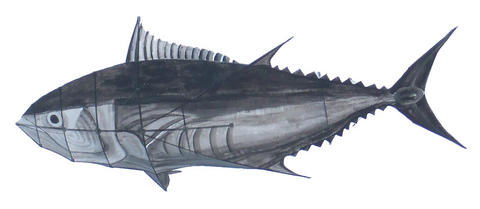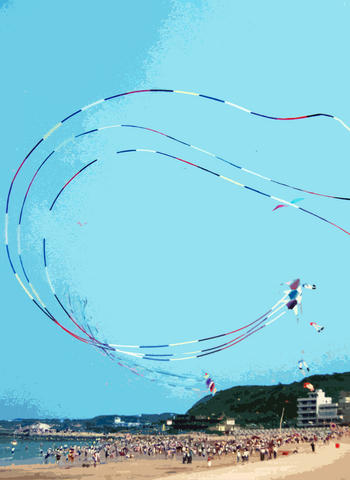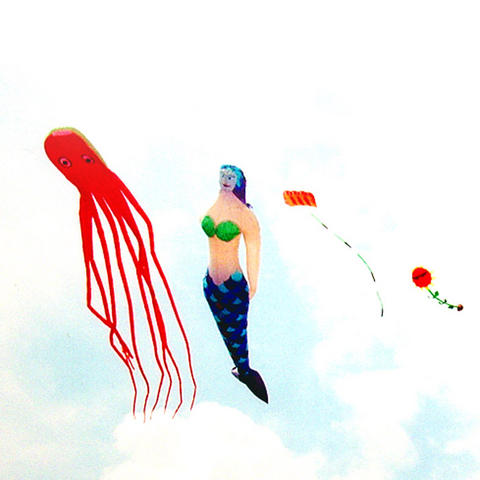Kiting history stretches back thousands of years into Asian history, having been used for entertainment, recreation, experimentation, warfare and sport. In the age of the Xbox and PS3, a kite might no longer be every child's dream, but a vibrant kite flying community continues to flourish around the world. These enthusiasts keep the ancient art of kite making alive, and push the boundaries of kites on aesthetic and scientific fronts. The Taipei County International Kite Festival (台北縣石門國際風箏節), which got off the ground seven years ago, will host kite fanatics from around the world this weekend.
According to Angela Wu (吳盈慧) of the National Kite Association (中華民國風箏推廣協會), kite flying has been slow to gain popularity in Taiwan, partly due to the ban on kites imposed during the martial law era - the government of the time cited national security for the measure. That's all history now, but as a result, until quite recently, the circuit of kite festivals around Asia bypassed Taiwan.
In 2000, the Taipei County Government launched the Taipei County International Kite Festival, which attracts tens of thousands of visitors each year.

Taiwan has its own recognized master kite makers - 12 of the best known will be participating in the event - but according to the National Kite Association, if attitudes toward kites do not change, the art's future is uncertain. The association hopes, with some justification given the success of previous events, that the influx of international talent and the party atmosphere of this weekend's activities will show Taiwanese people that the kiting tradition is worth keeping alive.
Nighttime kite flying is a new activity at this year's event. Kinetic artists including Jean-Paul Richon from France and Tomes Jeckle from Germany, are scheduled to combine wind and science to create dynamic sculptures.
Rokaku, or kite fighting, and demonstrations of kite aerial photography (KAP), which is primarily used for environmental work in sensitive habitats, are also on the schedule. Special guests - the ASEAN Kite Council, the Indonesia Kite Association and kite fliers from Malaysia, Japan, the US, France and South Korea - will participate in a mix of competitions, displays and demonstrations.

The Taipei County International Kite Festival will take place today 9am to 8:30pm and tomorrow 9am to 5pm in Laomei Village (老梅村) at the intersection of Laomei Street and the Danshui-Jinshan Highway (老梅街與淡金公路). A free shuttle bus will run from the Hongshulin metro station (紅樹林佔) on the Danshui Line (淡水縣) every half hour from 9:30am onward. Return buses will leave Laomei Village from 6:30pm. A full program in English can be found at www.twka.url.tw/web/active3.htm.


April 28 to May 4 During the Japanese colonial era, a city’s “first” high school typically served Japanese students, while Taiwanese attended the “second” high school. Only in Taichung was this reversed. That’s because when Taichung First High School opened its doors on May 1, 1915 to serve Taiwanese students who were previously barred from secondary education, it was the only high school in town. Former principal Hideo Azukisawa threatened to quit when the government in 1922 attempted to transfer the “first” designation to a new local high school for Japanese students, leading to this unusual situation. Prior to the Taichung First

The Ministry of Education last month proposed a nationwide ban on mobile devices in schools, aiming to curb concerns over student phone addiction. Under the revised regulation, which will take effect in August, teachers and schools will be required to collect mobile devices — including phones, laptops and wearables devices — for safekeeping during school hours, unless they are being used for educational purposes. For Chang Fong-ching (張鳳琴), the ban will have a positive impact. “It’s a good move,” says the professor in the department of

On April 17, Chinese Nationalist Party (KMT) Chairman Eric Chu (朱立倫) launched a bold campaign to revive and revitalize the KMT base by calling for an impromptu rally at the Taipei prosecutor’s offices to protest recent arrests of KMT recall campaigners over allegations of forgery and fraud involving signatures of dead voters. The protest had no time to apply for permits and was illegal, but that played into the sense of opposition grievance at alleged weaponization of the judiciary by the Democratic Progressive Party (DPP) to “annihilate” the opposition parties. Blamed for faltering recall campaigns and faced with a KMT chair

Article 2 of the Additional Articles of the Constitution of the Republic of China (中華民國憲法增修條文) stipulates that upon a vote of no confidence in the premier, the president can dissolve the legislature within 10 days. If the legislature is dissolved, a new legislative election must be held within 60 days, and the legislators’ terms will then be reckoned from that election. Two weeks ago Taipei Mayor Chiang Wan-an (蔣萬安) of the Chinese Nationalist Party (KMT) proposed that the legislature hold a vote of no confidence in the premier and dare the president to dissolve the legislature. The legislature is currently controlled